
Plastic waste in oceans is mainly close to coasts, researchers say

Most of the plastic waste polluting the planet’s oceans is within ten kilometres of the coast, rather than out on the open sea, University of Bern researchers have found.
“In all the scenarios we’ve calculated, about 80% of floating plastic waste drifts no more than ten kilometres from the coast five years after it entered the ocean,” said Victor Onink, the study’s lead author, in a University of Bern statement.
The large-scale study, published in the Environmental Research Letters journal, runs against previous models of tracking waste, which suggest that plastic tends to collect in large ocean gyres, or rotating currents.
Not only does it not reach the open seas, but at least over a third of plastic waste also then washes up onto beaches or gets stranded along coastlines, the researchers say.
They warn that this has “serious consequences for the environment, since coastal ecosystems are particularly sensitive to plastic pollution.” They also point out that polluted coasts “dramatically lose their value for tourism”.

More
Debris ahoy! Transforming ocean plastic into energy
More plastic than fish
Between one and 13 million tonnes of plastic waste enter the ocean each year. The issue, which has consequences for marine life as well as coastal ecosystems, has become a major environmental concern.
In 2016, the World Economic Forum predicted that if current trends continued, there will be more plastic than fish in the oceans by 2050.
Given the results of the Bern research, however, Onink is sceptical about highly-mediatised efforts to clean up the open seas.
“The concentration of plastic appears relatively low in the open ocean,” he said. “It makes you wonder if resources are really being used most efficiently with these kinds of projects.” For him, a better solution is to prevent plastic reaching the open ocean in the first place, for example by “fishing plastic out of large rivers or removing plastic from coastlines”.
Unsurprisingly, regions of the world with the highest volumes of plastic waste in general also end up having the most affected coastlines, the study found. These include South-East Asia and the Mediterranean region – which is doubly disadvantaged by pollution entering from the Nile river, and by its small and enclosed situation.
Least affected areas are generally less- populated regions like the Poles, the Chilean coast, and some parts of the Australian littoral.

More
How to clear the ocean of plastic? With a giant sailing boat

In compliance with the JTI standards
More: SWI swissinfo.ch certified by the Journalism Trust Initiative


























You can find an overview of ongoing debates with our journalists here . Please join us!
If you want to start a conversation about a topic raised in this article or want to report factual errors, email us at english@swissinfo.ch.